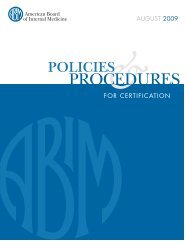The SRA Symposium - College of Medicine
The SRA Symposium - College of Medicine
The SRA Symposium - College of Medicine
You also want an ePaper? Increase the reach of your titles
YUMPU automatically turns print PDFs into web optimized ePapers that Google loves.
Papers<br />
Similarly, the OGE audit indicated that the stringent limits on the outside activities <strong>of</strong> NIH senior<br />
management (the NIH Director, deputy directors and associate directors, as well as institute and<br />
center directors and deputy directors) were not in compliance with OGE regulations affecting all<br />
executive branch agencies. (Working Group 2004, at 46 – 47.) Those limits, too, had to go.<br />
Thus, several prohibitions on NIH employees that had been in place fell in compliance with the<br />
OGE review. Stones <strong>of</strong> this tumbled Jericho wall had prohibited NIH employees from:<br />
• engaging in outside activity with entities having involvement with the employee’s institute,<br />
center or division;<br />
• accepting compensation in excess <strong>of</strong> $25,000 from outside firms—and no more than $12,500<br />
from any one firm;<br />
• performing in excess <strong>of</strong> 500 hours per year <strong>of</strong> compensated outside service;<br />
• accepting stock for themselves, their spouses and minor children as compensation for outside<br />
work; and<br />
• serving as managers or on boards <strong>of</strong> directors <strong>of</strong> related activities. (Working Group 2004.)<br />
And so, with a Federal Register notice (61 FR 147 (1996) to the public and a memorandum from<br />
Director Varmus to his staff, the old restrictions were out and the new permissiveness in—all apparently<br />
with not only the approval <strong>of</strong> but a mandate from Congress, the Executive and the OGE.<br />
(Working Group 2004.)<br />
As <strong>of</strong> the end <strong>of</strong> July <strong>of</strong> 1996, the “Varmus rules” were in place. (61 FR 147, 1996).<br />
2. <strong>The</strong> New-er Predicate: February 3, 2005<br />
<strong>The</strong> Presidential elections <strong>of</strong> 2000 came and went.<br />
January <strong>of</strong> 2001 arrived—soon thereafter so did a new Executive administration.<br />
Thirty-five months later the L.A. Times published Willman’s exposé.<br />
Congress was shocked. And appalled. And held hearings.<br />
In its Federal Register Interim Final Rule Notice <strong>of</strong> February 3, 2005, that followed those hearings,<br />
the Department <strong>of</strong> Health and Human Services (HHS) stated that it was making changes to the<br />
ethics regulations “based on the experience that has been garnered by the Department in implementing<br />
the regulation since it was issued in 1996”—since, i.e., the Varmus rules—to “establish [ ]<br />
more specific requirements with respect to [NIH employee] requests for approval <strong>of</strong> outside activities<br />
and impose [ ] an annual reauthorization process.” (70 FR22 (2005), at 5543.)<br />
By way <strong>of</strong> explanation, the Notice continues:<br />
Outside activities with entities substantially affected by NIH programs, policies, or<br />
operations must be further restricted in order to avoid the potential for real or apparent<br />
conflicts <strong>of</strong> interest that may threaten the integrity <strong>of</strong> the critically important research<br />
conducted and sponsored by the NIH. This assessment is informed by recommendations<br />
<strong>of</strong> the Advisory Committee to the NIH Director that were presented in the June 22,<br />
2004, Report <strong>of</strong> the NIH Blue Ribbon Panel on Conflict <strong>of</strong> Interest Policies (Blue Ribbon<br />
Panel Report), available at http://www.nih.gov/about/ethics_COI_panelreport.htm, but is<br />
predicated upon a consideration <strong>of</strong> various outside activities <strong>of</strong> NIH employees that have<br />
been subject to inquiry and the desire to advance sound public policy. Many <strong>of</strong> the panel<br />
recommendations and related issues were highlighted and discussed at Congressional<br />
hearings on outside consulting arrangements by NIH employees. Panel recommendations<br />
to liberalize certain current restrictions were not adopted in this rule. Additional restrictions<br />
are necessary because NIH operations increasingly require significant interaction<br />
80 2005 <strong>Symposium</strong> Proceedings Book

















